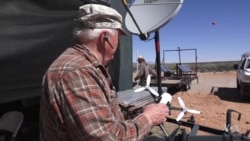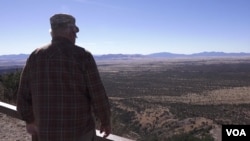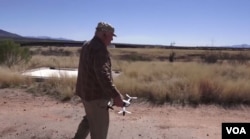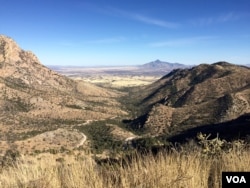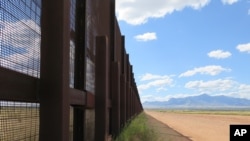Fifteen years ago, Glenn Spencer left behind his California life — and eventually his marriage — in pursuit of an obsession: “I came out to Arizona to help secure the border.”
On his Cochise County, Arizona ranch — roughly a football field’s distance from the rust metal barrier that separates the United States and Mexico — Spencer lays a drone flat on the dust and puts his seismograph-based detection system to test.
Within seconds, it disappears, humming quietly into an unforgiving sky. But Spencer never loses sight of his drone on a monitor. Underneath a mesh shade, he maneuvers a joystick like a young boy with his new toy.
It may seem like a game, but Spencer’s man-hunting mission carries dire consequences for those who have risked it all crossing the Sonoran Desert.
“The computer is looking at five miles of information, and then when something happens, the algorithm says, ‘Hey, there’s people out there,’” he explains, pointing to visual aids that he has set up in his warehouse for the curious. Once a migrant is detected, a sensor relays the coordinates, which Spencer promptly calls in.
U.S. Customs and Border Patrol has not asked for Spencer’s help or that of any vigilante or private militia group, and the Southern Poverty Law Center calls the organization Spencer founded, American Border Patrol, a hate group. But he reports his findings anyway, hoping to shed light on the number of crossings that he says goes undetected, while fiercely denying allegations of racism as “demonizing” tactics on the part of “the opposition.”
‘National survival’
Over the years, Spencer boasts that he has “caught” hundreds of border crossers without ever approaching them. He devoutly (but without evidence) believes most of them are drug-smugglers, due to the “60-pound” size of their packs. “America’s Eyes on the Border: Drug smugglers/addicts don’t like us” reads the sign at the entrance to his ranch.
According to the United States Sentencing Commission, nearly 20,000 drug trafficking cases were reported in fiscal year 2015, and approximately 75 percent of offenders were U.S. citizens.
Whether any of the border crossers might be fleeing their country due to economic hardship, gang violence or fear of persecution, Spencer finds it difficult to know, due to his hands-off approach. Still, his principles remain steadfast.
When asked if he has sympathy for those who may be trying to escape a difficult or even dangerous life, he's silent for a long while.
“Look at it this way,” he finally replies. "They have a situation where they’re trying to escape. I believe by us allowing them to escape, they run away from their problems.
“I have to trade off compassion for national survival.”
Far from mainstream
“Talking to people who have those sorts of views on the U.S.-Mexico border, they are coming from a place of scarcity,” says Juanita Molina, executive director of Border Action Network, a human rights organization that strives for community reconciliation. “[They] aren’t necessarily tuned into some of the predominant statistics about what the quality of life is here in the United States and how that is perpetuated by immigration.”
Mo Goldman, a first-generation immigration lawyer based in Tucson, Arizona, says there is a huge rejection of vigilantes in Arizona, whose actions he considers a waste of resources and existence.
“Their viewpoint is, ‘Hey, we're patriotic. We're going to seal up the border, we’re going to catch these people, and we're going to call the border patrol,’” Goldman said. “If that's what they want to do, fine. I think a lot of people in this community think that that is not the right thing to do and they reject that mentality.”
Spencer’s platform is far removed even from mainstream conservatism. He says organizations like the Heritage Foundation are cautious not to associate themselves with him, which has become a normal, bothersome aspect of his life. But his views on immigration range from extreme-right to conspiratorial.
During the afternoon, he repeats often his belief that Mexicans are deliberately voting in the United States in the interests of Mexico in order to revert the Treaty of Guadalupe Hidalgo, which granted more than 1.3 million square kilometers of territory to the U.S. in 1848.
It's projected that in less than 30 years, more than half of all Americans will be members of a minority group, making the U.S. a majority-minority nation. Spencer says that change of demographics is “not natural.”
“If you get a power bloc of Hispanics … they are going to be a swing vote. They’re going to change everything,” Spencer said.
Molina, who mentions she would welcome a dialogue with Spencer, says the border region in Arizona has become a convening point for others who share his views.
“It becomes the place where like-minded people believe in this level of polarization and othering of migrants,” Molina said. “And that becomes a core value for them.”
‘Some people golf…’
Though Spencer says he has not had a girlfriend since he moved to Arizona, he is not completely secluded on the ranch. His handyman Chad works beside him, and he is the proud owner of “200 catfish, eight chickens, three German shepherds and two horses.”
At almost 80, the only health issue he admits to is high blood pressure, which has a dizzying effect; he attributes it to stress. He is his own book-keeper too.
Beside a rock garden pond, three aged companions wag their greetings, fur spewing in every direction. Spencer promptly turns off Fox News and cranks the volume of his stereo to mellow classical tunes - for the dogs.
“This is retirement,” he says with satisfaction. “Some people golf, some have missions.”
Got to defend…
The mission transcends even his once more-enthusiastic support for President Donald Trump.
“You do not build a solid wall on a border,” he says. “It has to be transparent. It has to allow the water to flow through.” Through Spencer’s eyes, the question at play when securing the border is not humanity, but efficiency. The solar-powered integrated fixed towers that currently function across the desert have poor visibility, he claims. He directs his drone to the top of one to demonstrate.
“If there was a man down in there, could you see him?” His voice becomes agitated.
“You would not be able to see anybody in those trees … you’d have to know exactly where to look!”
Spencer says he has spent the latter years of his life “digging and digging and digging” for information that is increasingly at odds with media outlets that ignore or “white-wash” his most unverifiable claims.
As the interview ends, Spencer offers a final summation of what he sees at stake here at the border, flexing his jaw with every syllable.
“America can't start over again. That won't happen again. If we lose that, that's it. We have got to keep it. We've got to hold it. We've got to defend it. And that's what I do.”




